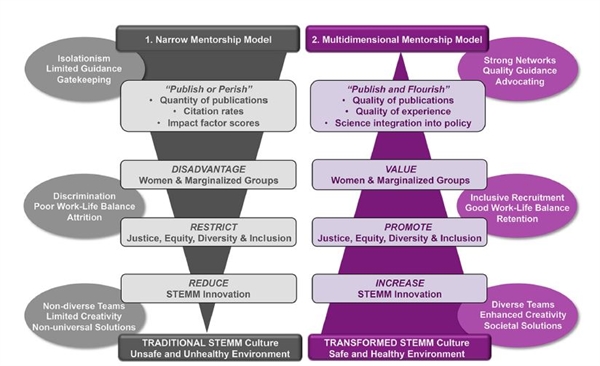
A 2020 study highlighted that the citation gap between genders was skewed a full 30 percent in favour of male scientists across thirteen STEMM (Science, Technology, Engineering, Mathematics, Medicine) disciplines. Other studies have highlighted sex-specific conscious and unconscious biases that lead to a higher rate of manuscript rejections and lower rate of publication in prestigious journals for women.
Discussions of a broken value system are prevalent across different fields of science and research, and are exposing deeply-entrenched, systemic sexism and racism. While equity within science has made some advancements, the system remains outdated, colonialist and patriarchal. It overemphasises contributions of males and fails to take into account the breadth of an individual’s meaningful scientific impacts outside of scientific literature—especially the contributions of women, non-binary genders, and other marginalised groups.
For a new paper published in PLoS Biology, I joined a group of 23 other women from different geographies and backgrounds to review the narrow definitions of success and impact in science that can have consequences for careers in science, especially for systemically marginalized groups, including women. In doing this, we wanted to let the evidence and data speak for itself.
We found that the current “publish or perish” model narrowly rewards quantity of publications, citations rates, and journal impact factors, and can determine career advancement, particularly in academia. However, the lack of gender balance and ethnic diversity amongst scientists being cited is not reflective of capacity and ability, but the historical demographics of departments and faculties in universities and research institutions.
Publication metrics are also revealing biases against ethnically diverse scientists, who experience lower acceptance rates, are less likely to be cited by other authors, and are required to have a high level of English proficiency or funding to get editorial support.
This is further exacerbated by “parachute or helicopter science” – terms used to describe international scientists with greater access to funding and scientific opportunity, conducting field studies in lower income countries in a manner that undermines and undervalues the roles and contributions to local scientists (usually from the Global South).
The larger implications of gender and racial biases is that it limits innovation and advancement by failing to capitalize on diverse voices, talents, perspectives, knowledge systems and approaches to address the pressing needs of the planet. An alternative vision is to build a new academic model that values the recruitment and retention of diverse scientists through fostering safe and healthy work environments. This includes healthy inclusive mentoring practices such as sponsoring, counselling, networking, and advocating for mentees to support them in their STEMM careers. Institutions should therefore create a culture that promotes the wellness of its staff and students, especially those from marginalized groups.
In order to transform STEMM systems, members of the global scientific community, especially those in positions of power and privilege, need to recognize and reject all forms of systematic biases, especially towards women and marginalized groups, and adopt a wider scientific value system that measures success and impact beyond citations.
This new model should recognize non-academic science careers, teaching, mentoring, and contributions to critical policy and decision-making. Investments in mentoring, and the contributions of mentors and the achievements of mentees, need greater recognition and should not be limited to, for example, students or those in the early parts of their career.
Adoption of better practice means making meaningful and not tokenistic collaborations with others, especially those who are marginalized or in countries with low income and opportunities.
Transforming institutional value systems, cultures and practices towards a system that values justice, equity, diversity, and inclusion is critical for the scientific advancement of humankind. This may require awards and incentives that recognize and reward authentic efforts to do so, create mechanisms to monitor implementation, and adapt and initiate positive spaces for dialogue where diverse voices and opinions are valued and matter.
Citation:
Davies SW, Putnam HM, Ainsworth T, Baum JK, Bove CB, Crosby SC, Côté IM, Duplouy A, Fulweiler RW, Griffin AJ, Hanley TC, Hill T, Humanes A, Mangubhai S, Metaxas A, Parker LM, Rivera HE, Silbiger NJ, Smith NS, Spalding AK, Traylor-Knowles N, Weigel BL, Wright RM, Bates AE (2021) Promoting inclusive metrics of success and impact to dismantle a discriminatory reward system in science. PLoS Biol. 19(6): e3001282. https://doi.org/10.1371/journal.pbio.3001282